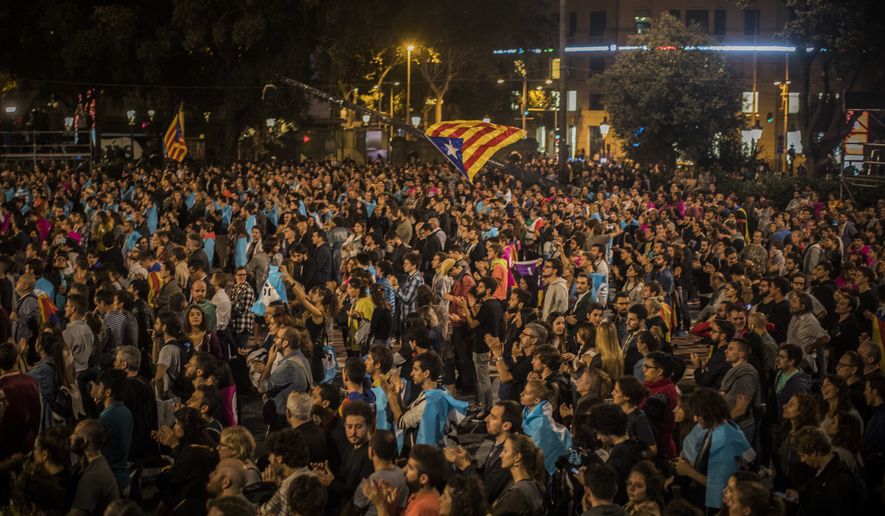Russian propagandists scored a victory in Spain this weekend after “boldly injecting fake news and disinformation” into the debate over Catalonian independence and apparently influencing the election results, according to U.S. information warfare experts.
The divisive nature of Sunday’s chaotic poll, in which voters backed the Catalonia regional government’s disputed referendum to declare independence from Spain, featured Russian state-backed news outlets and social network robotic accounts leveraging the mayhem to push the Kremlin’s larger anti-Western and anti-democracy themes.
“What is so troubling is that the Russians used the same playbook and nobody seems to care,” information warfare expert Molly K. McKew told The Washington Times. “It’s the constant drumbeat: ’Minorities are disadvantaged, the West has nothing to offer, democracy doesn’t work.’”
On Capitol Hill, multiple congressional probes investigating Russian meddling in the 2016 election have zeroed in on a similar pattern of Kremlin-backed propaganda amplifying divisive social issues across Facebook and Twitter last year.
Experts say the Kremlin has perfected the technique of finding divisive social issues including race, gun control, religion or gay rights to highlight rather than trying to promote an individual candidate or position. Eastern European and Russian “troll farms” and robotic accounts then use algorithms to make polarizing hot-button topics trend across a country’s internet space.
Ms. McKew, who has advised the Georgian and Moldovan governments, said that in the Catalonian independence election, Moscow appeared to pull from a playbook it has perfected in recent years.
“The Kremlin can’t create these societal divisions,” she said, speaking by telephone from Estonia. “But they can find them and turn the volume way up. They did it in the U.S. — find a bitter partisan divide and [exploited] Brexit” — the U.K. vote to leave the European Union — “was similar.”
“Moscow fights a subtle war of subversion rather than domination,” she said, adding that last month’s Iraqi Kurdish independence referendum saw Russian efforts to influence the debate. The recent Dutch and German elections, however, witnessed less overt Russian propaganda, experts say, because the divisive issues were not as clear-cut.
In the lead-up to Catalonia’s referendum, which the central government argued was unconstitutional, the Madrid-based El Pais provided coverage of a report warning of Russian interference, especially from what has been called the government-funded broadcaster Russia Today, or RT.
The station was accused of pushing fake referendum news from its Spanish-language portal. Fake tweets on the issue from NSA contractor and leaker Edward Snowden and WikiLeaks founder Julian Assange also drew heavy traffic just before the vote.
Ms. McKew called Mr. Assange and Mr. Snowden regular players in the Kremlin influence playbook.
“The sad part is,” she said, “people know they have no credibility, but when a local issue comes from their mouth, people don’t care about the source, they just react.”
Before the vote, Russia’s ambassador to Spain denied Moscow had any role in the independence debate.
“Russia is in no way connected to these processes and has no interest in being connected to them,” Yuri Korchagin told Sputnik, a Russian-backed news outlet known to have published multiple fake news stories about Catalonia’s referendum.
• Dan Boylan can be reached at dboylan@washingtontimes.com.




Please read our comment policy before commenting.